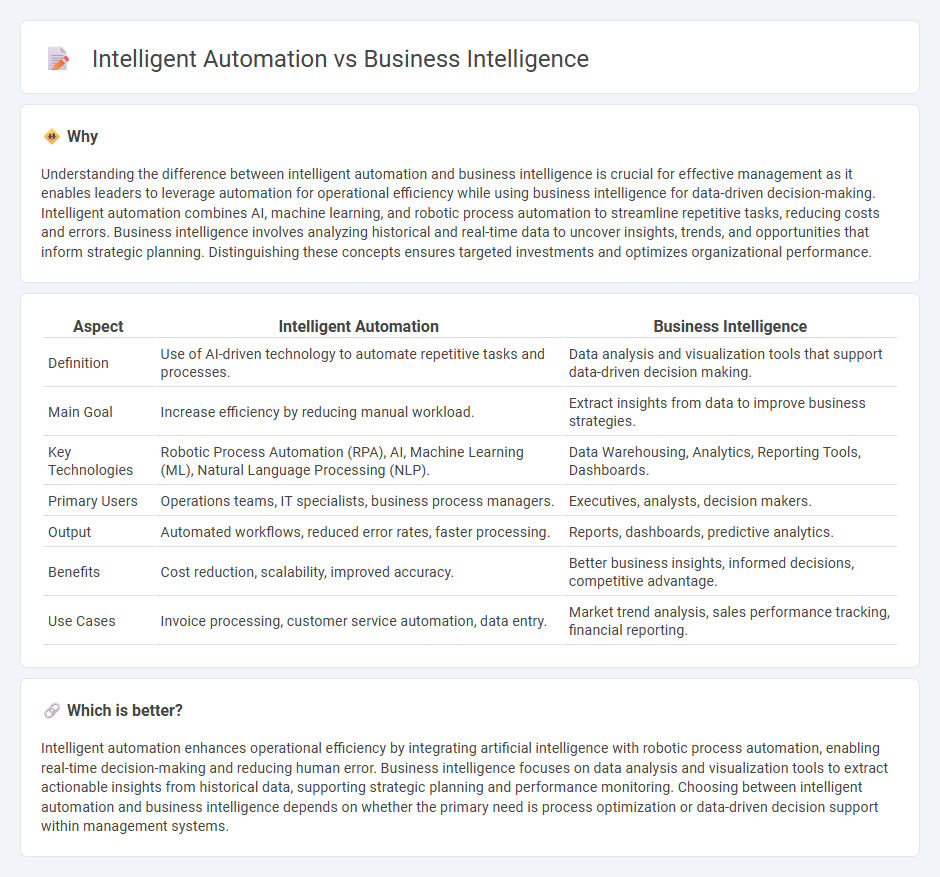
Intelligent automation integrates AI-driven technologies to streamline complex business processes, enhancing operational efficiency and reducing human error. Business intelligence focuses on data analysis and visualization, enabling informed decision-making through real-time insights and historical trends. Explore how combining these technologies can transform management strategies and drive competitive advantage.
Why it is important
Understanding the difference between intelligent automation and business intelligence is crucial for effective management as it enables leaders to leverage automation for operational efficiency while using business intelligence for data-driven decision-making. Intelligent automation combines AI, machine learning, and robotic process automation to streamline repetitive tasks, reducing costs and errors. Business intelligence involves analyzing historical and real-time data to uncover insights, trends, and opportunities that inform strategic planning. Distinguishing these concepts ensures targeted investments and optimizes organizational performance.
Comparison Table
| Aspect | Intelligent Automation | Business Intelligence |
|---|---|---|
| Definition | Use of AI-driven technology to automate repetitive tasks and processes. | Data analysis and visualization tools that support data-driven decision making. |
| Main Goal | Increase efficiency by reducing manual workload. | Extract insights from data to improve business strategies. |
| Key Technologies | Robotic Process Automation (RPA), AI, Machine Learning (ML), Natural Language Processing (NLP). | Data Warehousing, Analytics, Reporting Tools, Dashboards. |
| Primary Users | Operations teams, IT specialists, business process managers. | Executives, analysts, decision makers. |
| Output | Automated workflows, reduced error rates, faster processing. | Reports, dashboards, predictive analytics. |
| Benefits | Cost reduction, scalability, improved accuracy. | Better business insights, informed decisions, competitive advantage. |
| Use Cases | Invoice processing, customer service automation, data entry. | Market trend analysis, sales performance tracking, financial reporting. |
Which is better?
Intelligent automation enhances operational efficiency by integrating artificial intelligence with robotic process automation, enabling real-time decision-making and reducing human error. Business intelligence focuses on data analysis and visualization tools to extract actionable insights from historical data, supporting strategic planning and performance monitoring. Choosing between intelligent automation and business intelligence depends on whether the primary need is process optimization or data-driven decision support within management systems.
Connection
Intelligent automation integrates advanced data analytics from business intelligence to streamline decision-making processes and enhance operational efficiency. Business intelligence tools provide real-time insights and predictive analytics that enable intelligent automation systems to adapt and optimize workflows dynamically. The synergy between these technologies drives more accurate forecasting, reduced human error, and improved resource allocation in management practices.
Key Terms
**Business Intelligence:**
Business Intelligence (BI) involves the systematic analysis of data to provide actionable insights that drive strategic decision-making and enhance operational efficiency. Utilizing tools such as data warehousing, reporting, and dashboards, BI transforms raw data into meaningful information for businesses. Explore how Business Intelligence can empower your organization to make data-driven decisions and stay competitive.
Data Analytics
Business intelligence leverages data analytics to transform raw data into actionable insights, enabling organizations to make informed decisions based on historical and real-time information. Intelligent automation integrates these analytics with AI-driven processes to optimize workflows, reduce manual tasks, and enhance operational efficiency. Explore how combining business intelligence and intelligent automation can revolutionize your data-driven strategies.
Reporting
Business intelligence (BI) specializes in data reporting by collecting, analyzing, and visualizing business metrics to support informed decision-making. Intelligent automation (IA) enhances reporting processes by automating data extraction, integration, and distribution, reducing manual effort and increasing accuracy. Explore how integrating BI and IA can transform your reporting efficiency and insights.
Source and External Links
Business intelligence - Business intelligence (BI) consists of strategies, methodologies, and technologies used by enterprises for data analysis and management of business information to support operational and strategic decisions by integrating internal and external data sources for competitive advantage and better insight.
What Is Business Intelligence (BI)? - BI is a set of technological processes for collecting, managing, and analyzing organizational data to generate insights that inform business strategies and operational decisions, enabling identification of market trends and new opportunities.
What is Business Intelligence (BI)? A Detailed Guide - Business intelligence is a technology-driven data analysis process that helps organizations make informed decisions via analytics, visualization, and reporting tools, evolving to include self-service BI and AI-enhanced augmented analytics for broader user access.
 dowidth.com
dowidth.com